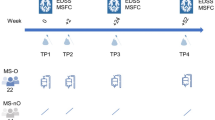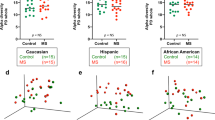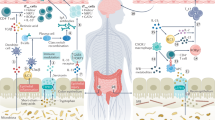Abstract
Background
The gut microbiome may play a role in multiple sclerosis (MS). However, its relationship with the disease-modifying therapies (DMTs) remains unclear. We systematically reviewed the literature to examine the relationship between DMTs and the gut microbiota among persons with MS (pwMS).
Methods
MEDLINE, EMBASE, Web of Science, and Scopus were searched (01/2007-09/2022) for studies evaluating potential gut microbiota differences in diversity, taxonomic relative abundances, and functional capacity between DMT-exposed/unexposed pwMS or before/after DMT initiation. All US FDA-approved MS DMTs (1993-09/2022) and rituximab were included.
Results
Of the 410 studies, 11 were included, totalling 1243 pwMS. Of these, 821 were DMT exposed and 473 unexposed, including 51 assessed before/after DMT initiation. DMT use duration ranged from 14 days to > 6 months. No study found a difference in gut microbiota alpha-diversity between DMT exposed/unexposed (p > 0.05). One study observed a difference in beta-diversity between interferon-beta users/DMT non-users (weighted UniFrac, p = 0.006). All studies examined taxa-level differences, but most (6) combined different DMTs. Two or more studies reported eight genera (Actinomyces, Bacteroides, Clostridium sensu stricto 1, Haemophilus, Megasphaera, Pseudomonas, Ruminiclostridium 5, Turicibacter) and one species (Ruthenibacterium lactatiformans) differing in the same direction between DMT exposed/unexposed. DMT users had lower relative abundances of carbohydrate degradation and reductive tricarboxylic acid cycle I pathway than non-users (p < 0.05), but findings could not be attributed to a specific DMT.
Discussion
While DMT use (versus no use) was not associated with gut microbiota diversity differences, taxa-level differences were observed. Further work is warranted, as most studies were cross-sectional, few examined functionality, and DMTs were combined.

Similar content being viewed by others
Data availability
All reported data are based on already published work; no novel data were reported.
References
Belkaid Y, Hand TW (2014) Role of the microbiota in immunity and inflammation. Cell 157(1):121–141. https://doi.org/10.1016/j.cell.2014.03.011
Carding S, Verbeke K, Vipond DT, Corfe BM, Owen LJ (2015) Dysbiosis of the gut microbiota in disease. Microb Ecol Health Dis 26:26191. https://doi.org/10.3402/mehd.v26.26191
Carabotti M, Scirocco A, Maselli MA, Severi C (2015) The gut-brain axis: interactions between enteric microbiota, central and enteric nervous systems. Ann Gastroenterol 28(2):203–209
Tremlett H, Bauer KC, Appel-Cresswell S, Finlay BB, Waubant E (2017) The gut microbiome in human neurological disease: a review. Ann Neurol 81(3):369–382. https://doi.org/10.1002/ana.24901
Mirza A, Forbes JD, Zhu F, Bernstein CN, Van Domselaar G, Graham M et al (2020) The multiple sclerosis gut microbiota: a systematic review. Mult Scler Relat Disord 37:101427. https://doi.org/10.1016/j.msard.2019.101427
Yang JH, Rempe T, Whitmire N, Dunn-Pirio A, Graves JS (2022) Therapeutic advances in multiple sclerosis. Front Neurol. https://doi.org/10.3389/fneur.2022.824926
iMSMS Consortium (2022) Gut microbiome of multiple sclerosis patients and paired household healthy controls reveal associations with disease risk and course. Cell 185(19):3467-86e16. https://doi.org/10.1016/j.cell.2022.08.021
Mirza AI, Zhu F, Knox N, Forbes JD, Van Domselaar G, Bernstein CN et al (2022) Metagenomic Analysis of the Pediatric-Onset Multiple Sclerosis Gut Microbiome. Neurology 98(10):e1050–e1063. https://doi.org/10.1212/WNL.0000000000013245
Troci A, Zimmermann O, Esser D, Krampitz P, May S, Franke A et al (2022) B-cell-depletion reverses dysbiosis of the microbiome in multiple sclerosis patients. Sci Rep 12(1):3728. https://doi.org/10.1038/s41598-022-07336-8
Castillo-Alvarez F, Perez-Matute P, Oteo JA, Marzo-Sola ME (2021) The influence of interferon beta-1b on gut microbiota composition in patients with multiple sclerosis. Neurologia (Engl Ed) 36(7):495–503. https://doi.org/10.1016/j.nrleng.2020.05.006
Cox LM, Maghzi AH, Liu S, Tankou SK, Dhang FH, Willocq V et al (2021) Gut Microbiome in Progressive Multiple Sclerosis. Ann Neurol 89(6):1195–1211. https://doi.org/10.1002/ana.26084
Kozhieva M, Naumova N, Alikina T, Boyko A, Vlassov V, Kabilov MR (2021) The Core of Gut Life: Firmicutes Profile in Patients with Relapsing-Remitting Multiple Sclerosis. Life (Basel). https://doi.org/10.3390/life11010055
Tremlett H, Zhu F, Arnold D, Bar-Or A, Bernstein CN, Bonner C et al (2021) The gut microbiota in pediatric multiple sclerosis and demyelinating syndromes. Ann Clin Transl Neurol 8(12):2252–2269. https://doi.org/10.1002/acn3.51476
Katz Sand I, Zhu Y, Ntranos A, Clemente JC, Cekanaviciute E, Brandstadter R et al (2019) Disease-modifying therapies alter gut microbial composition in MS. Neurol Neuroimmunol Neuroinflamm 6(1):e517. https://doi.org/10.1212/NXI.0000000000000517
Storm-Larsen C, Myhr KM, Farbu E, Midgard R, Nyquist K, Broch L et al (2019) Gut microbiota composition during a 12-week intervention with delayed-release dimethyl fumarate in multiple sclerosis—a pilot trial. Mult Scler J Exp Transl Clin 5(4):2055217319888767. https://doi.org/10.1177/2055217319888767
Jangi S, Gandhi R, Cox LM, Li N, von Glehn F, Yan R et al (2016) Alterations of the human gut microbiome in multiple sclerosis. Nat Commun 7:12015. https://doi.org/10.1038/ncomms12015
Cantarel BL, Waubant E, Chehoud C, Kuczynski J, DeSantis TZ, Warrington J et al (2015) Gut microbiota in multiple sclerosis: possible influence of immunomodulators. J Investig Med 63(5):729–734. https://doi.org/10.1097/JIM.0000000000000192
Flanagin A, Frey T, Christiansen SL, Committee AMAMoS (2021) Updated Guidance on the Reporting of Race and Ethnicity in Medical and Science Journals. JAMA 326(7):621–627. https://doi.org/10.1001/jama.2021.13304
Strom BL (2007) Pharmacoepidemiology, 4th edn. John Wiley & Sons, Chichester, pp 791–809
Finkelsztejn A (2014) Multiple sclerosis: overview of disease-modifying agents. Perspect Medicin Chem 6:65–72. https://doi.org/10.4137/PMC.S13213
Wijnands JMA, Zhu F, Kingwell E, Fisk JD, Evans C, Marrie RA et al (2018) Disease-modifying drugs for multiple sclerosis and infection risk: a cohort study. J Neurol Neurosurg Psychiatry 89(10):1050–1056. https://doi.org/10.1136/jnnp-2017-317493
Camara-Lemarroy CR, Metz L, Meddings JB, Sharkey KA, Wee YV (2018) The intestinal barrier in multiple sclerosis: implications for pathophysiology and therapeutics. Brain 141(7):1900–1916. https://doi.org/10.1093/brain/awy131
Erturk-Hasdemir D, Ochoa-Reparaz J, Kasper DL, Kasper LH (2021) Exploring the Gut-Brain Axis for the Control of CNS Inflammatory Demyelination: Immunomodulation by Bacteroides fragilis’ Polysaccharide A. Front Immunol 12:662807. https://doi.org/10.3389/fimmu.2021.662807
Plaza-Diaz J, Manzano M, Ruiz-Ojeda FJ, Giron MD, Salto R, Lopez-Pedrosa JM et al (2022) Intake of slow-digesting carbohydrates is related to changes in the microbiome and its functional pathways in growing rats with obesity induced by diet. Front Nutr 9:992682. https://doi.org/10.3389/fnut.2022.992682
den Besten G, van Eunen K, Groen AK, Venema K, Reijngoud DJ, Bakker BM (2013) The role of short-chain fatty acids in the interplay between diet, gut microbiota, and host energy metabolism. J Lipid Res 54(9):2325–2340. https://doi.org/10.1194/jlr.R036012
Frankel AE, Deshmukh S, Reddy A, Lightcap J, Hayes M, McClellan S et al (2019) Cancer Immune Checkpoint Inhibitor Therapy and the Gut Microbiota. Integr Cancer Ther 18:1534735419846379. https://doi.org/10.1177/1534735419846379
Ordonez-Rodriguez A, Roman P, Rueda-Ruzafa L, Campos-Rios A, Cardona D (2023) Changes in Gut Microbiota and Multiple Sclerosis: A Systematic Review. Int J Environ Res Public Health. https://doi.org/10.3390/ijerph20054624
US Food and Drug Administration. (2022). OCREVUS® (ocrelizumab) injection, for intravenous use. https://www.accessdata.fda.gov/drugsatfda_docs/label/2022/761053s029s030lbl.pdf Accessed 31Mar 2023
Pilotto S, Zoledziewska M, Fenu G, Cocco E, Lorefice L (2023) Disease-modifying therapy for multiple sclerosis: Implications for gut microbiota. Mult Scler Relat Disord 73:104671. https://doi.org/10.1016/j.msard.2023.104671
Diebold M, Meola M, Purushothaman S, Siewert LK, Possnecker E, Roloff T et al (2022) Gut microbiota composition as a candidate risk factor for dimethyl fumarate-induced lymphopenia in multiple sclerosis. Gut Microbes 14(1):2147055. https://doi.org/10.1080/19490976.2022.2147055
Ferri C, Castellazzi M, Merli N, Laudisi M, Baldin E, Baldi E et al (2023) Gut Microbiota Changes during Dimethyl Fumarate Treatment in Patients with Multiple Sclerosis. Int J Mol Sci. https://doi.org/10.3390/ijms24032720
Acknowledgements
We would like to thank Vanessa Kitchin (librarian, University of British Columbia Faculty of Medicine) for assistance in refining the search strategy used in this review. This study was supported, in part, by the 2022 UBC Multiple Sclerosis Connect Program Summer Studentship Award funded by the Christopher Foundation (recipient: CT).
Author information
Authors and Affiliations
Corresponding author
Ethics declarations
Conflicts of interest
CT received support from the 2022 University of British Columbia (UBC) MS Connect Summer Studentship Award funded from the Christopher Foundation to conduct this work. CT receives funding from the Consortium of MS Centres and has had travel expenses reimbursed by MS Canada. SJ reports no disclosures. HT has, in the last 5 years, received research support from the Canada Research Chair Program, the National Multiple Sclerosis Society, the Canadian Institutes of Health Research, the Multiple Sclerosis Society of Canada, the Multiple Sclerosis Scientific Research Foundation and the EDMUS Foundation (‘Fondation EDMUS contre la sclérose en plaques’); in addition, in the last 5 years, has had travel expenses or registration fees prepaid or reimbursed to present at CME conferences from the Consortium of MS Centres (2018, 2023), National MS Society (2016, 2018, 2022), ECTRIMS/ACTRIMS (2015, 2016, 2017, 2018, 2019, 2020, 2021, 2022, 2023), and American Academy of Neurology (2015, 2016, 2019). Speaker honoraria are either declined or donated to an MS charity or to an unrestricted grant for use by HT’s research group.
Supplementary Information
Below is the link to the electronic supplementary material.
Rights and permissions
Springer Nature or its licensor (e.g. a society or other partner) holds exclusive rights to this article under a publishing agreement with the author(s) or other rightsholder(s); author self-archiving of the accepted manuscript version of this article is solely governed by the terms of such publishing agreement and applicable law.
About this article
Cite this article
Tsai, CC., Jette, S. & Tremlett, H. Disease-modifying therapies used to treat multiple sclerosis and the gut microbiome: a systematic review. J Neurol 271, 1108–1123 (2024). https://doi.org/10.1007/s00415-023-12107-0
Received:
Revised:
Accepted:
Published:
Issue Date:
DOI: https://doi.org/10.1007/s00415-023-12107-0




